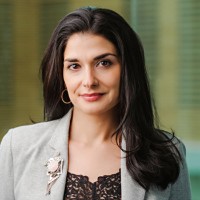Izabela Steflja

Associate Professor
Faculty of Arts
Political Science
Waterloo, Ontario
isteflja@wlu.ca
Office:
(519) 884-0710
Languages
Bosnian
Croatian
English
Serbian
Croatian
English
Serbian
Bio/Research
I am an Associate Professor and Sussex/Law Advisor in the Department of Political Science at Wilfrid Laurier University. I am also the Conflict and Security Research Cluster Lead at the Balsillie School for International Affairs, and a Tshepo Institute for the Study of Contemporary Africa Fellow....
Click to Expand >>
Click to Expand >>
Bio/Research
I am an Associate Professor and Sussex/Law Advisor in the Department of Political Science at Wilfrid Laurier University. I am also the Conflict and Security Research Cluster Lead at the Balsillie School for International Affairs, and a Tshepo Institute for the Study of Contemporary Africa Fellow.
I received my PhD (2015) and my HBA (2006) from the University of Toronto, and my MA (2008) from McGill University.
Prior to joining Laurier, I was Professor of Practice in Political Science and International Development at Tulane University (2016-2021). I was also the Simons Research Fellow in Dialogue on International Law and Human Security at Simon Fraser University (2014-2015) and a visiting fellow in international development at the London School of Economics and Political Science (2013-2014).
The core of my research deals with pressing issues in postconflict justice, such as the relationship between conflict-affected communities and international criminal courts, and the efforts to address women and children’s participation in war crimes and mass atrocities. This includes unsettling assumptions about people’s lived experiences in conflict, disturbing binary understandings of victims and perpetrators, and questioning interventions that do not center the voices of individuals most affected by mass violence. My research is rooted in years of ethnographic fieldwork in postconflict settings in East and Central Africa and the Balkans.
My current research program explores the conceptualization of child soldiering across multiple geographic, temporal, and social contexts, including fieldwork in several countries (Bosnia, Cameroon, and Canada). I am the PI on a SSHRC/DNDRI-funded project, Victims, Soldiers or Terrorists? Labelling of Children Associated with Armed Groups (2024-26), that challenges normative assumptions about childhood and agency, exposes embedded colonial and gender ideologies, and disrupts labels and the inequitable representation of children associated with armed groups.
Click to Shrink <<
I received my PhD (2015) and my HBA (2006) from the University of Toronto, and my MA (2008) from McGill University.
Prior to joining Laurier, I was Professor of Practice in Political Science and International Development at Tulane University (2016-2021). I was also the Simons Research Fellow in Dialogue on International Law and Human Security at Simon Fraser University (2014-2015) and a visiting fellow in international development at the London School of Economics and Political Science (2013-2014).
The core of my research deals with pressing issues in postconflict justice, such as the relationship between conflict-affected communities and international criminal courts, and the efforts to address women and children’s participation in war crimes and mass atrocities. This includes unsettling assumptions about people’s lived experiences in conflict, disturbing binary understandings of victims and perpetrators, and questioning interventions that do not center the voices of individuals most affected by mass violence. My research is rooted in years of ethnographic fieldwork in postconflict settings in East and Central Africa and the Balkans.
My current research program explores the conceptualization of child soldiering across multiple geographic, temporal, and social contexts, including fieldwork in several countries (Bosnia, Cameroon, and Canada). I am the PI on a SSHRC/DNDRI-funded project, Victims, Soldiers or Terrorists? Labelling of Children Associated with Armed Groups (2024-26), that challenges normative assumptions about childhood and agency, exposes embedded colonial and gender ideologies, and disrupts labels and the inequitable representation of children associated with armed groups.
Click to Shrink <<
Media Relations
Aonghus Kealy
Communications and Media Relations Officer
akealy@wlu.ca
(548) 889-4855
Click to Expand >>
Communications and Media Relations Officer
akealy@wlu.ca
(548) 889-4855
Click to Expand >>
Media Relations
Aonghus Kealy
Communications and Media Relations Officer
akealy@wlu.ca
(548) 889-4855
Lori Chalmers Morrison
Director: Integrated Communications
lchalmersmorrison@wlu.ca
(548) 889-4857
Vanessa Barrasa
Director: Communications & Issues Management
vbarrasa@wlu.ca
(548) 889-3812
Brantford Campus:
Beth Gurney
Director, Strategic Communications and Community Engagement
bgurney@wlu.ca
(548) 889-4199
Click to Shrink <<
Communications and Media Relations Officer
akealy@wlu.ca
(548) 889-4855
Lori Chalmers Morrison
Director: Integrated Communications
lchalmersmorrison@wlu.ca
(548) 889-4857
Vanessa Barrasa
Director: Communications & Issues Management
vbarrasa@wlu.ca
(548) 889-3812
Brantford Campus:
Beth Gurney
Director, Strategic Communications and Community Engagement
bgurney@wlu.ca
(548) 889-4199
Click to Shrink <<